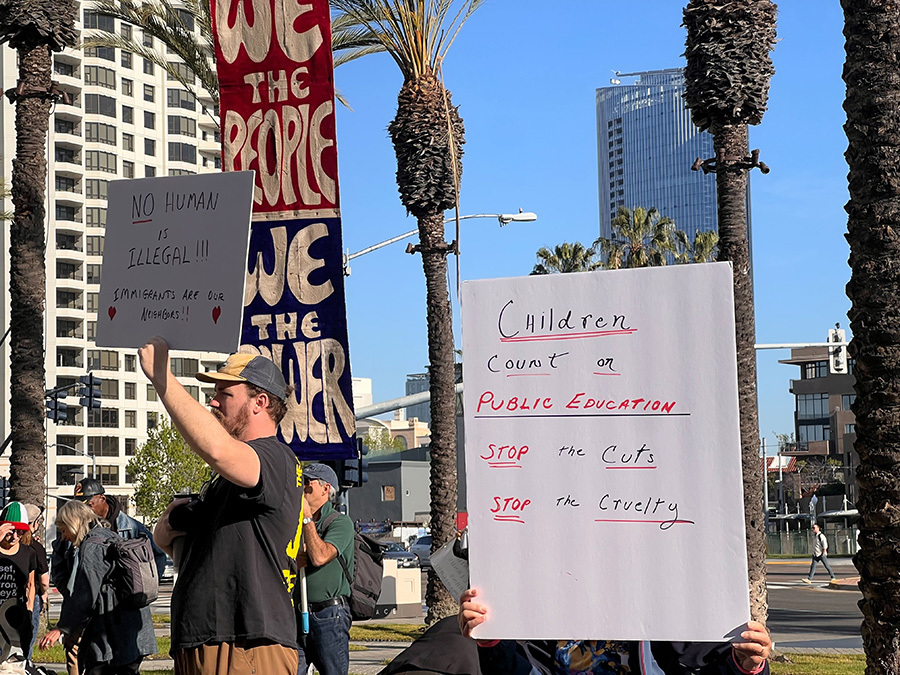The NAEP Test ‘Absolutely’ Needs to Stay, Linda McMahon Says. The Education Department? Not So Much
Following a speech at ASU+GSV, the education secretary spoke briefly with The 74 about civil rights, dismantling the department and NAEP’s future.

Get stories like this delivered straight to your inbox. Sign up for The 74 Newsletter
San Diego
U.S. Education Secretary Linda McMahon on Tuesday told a crowd of educators, tech executives and investors that public education in America is unsustainable, suggesting that the nation’s low literacy and math scores show it has “gotten to a point that we just can’t keep going along doing what we’re doing.”
Speaking at the annual ASU+GSV Summit in San Diego, McMahon, the former CEO of World Wrestling Entertainment, said, “Let’s shake it up. Let’s do something different. And it’s not through bureaucracy in Washington — that is not where it happens.”
A small group of protesters picketed the appearance, but in the midmorning fireside talk, delivered to a receptive standing-room crowd, McMahon said the Trump administration’s plans to dismantle the education department won’t mean the end of bedrock funding streams like Title I for low-income children or the Individuals with Disabilities Education Act for students with disabilities.
“Title I funding isn’t stopping,” she said, adding that funding for both programs would likely remain at the same levels moving forward, even if they shift to different agencies.

McMahon also said the department, which has fired about half of its staff in the first two-and-a-half months of Trump’s presidency, cancelled millions of dollars in research contracts and gutted in-house research efforts across the board, is studying revamping the Institute of Education Sciences. She also reassured the audience that the National Assessment of Educational Progress (NAEP) is “something we absolutely need to keep.”
“This is what keeps us honest, because it’s comparing apples to apples” nationwide.” If we don’t, states can … be a little manipulative with their own results and their own testing. But I think it’s a way that we keep everybody honest.”
But McMahon avoided talking about campus antisemitism and transgender athletes’ participation in women’s sports — two areas that the department is aggressively investigating.
Afterwards, McMahon sat for a brief interview with The 74’s Greg Toppo, where she expanded on her thoughts about NAEP, immigrant students and how her background rebuilding companies in the corporate world has prepared her to revamp the department.
The conversation has been edited for length and clarity.
In order to dismantle the department, you have to convince seven Democrats in the Senate to get this done. What’s the plan?
The plan is to help be partners. In fact, I had about a dozen Democrats in my office last week. I wanted to hear what they had to say. They wanted to share with me what their concerns were. I have said all along, and the President totally understands, that in order to close the Department of Education, it is an act of Congress. By the time we get to this point, hopefully they will see the benefits of education operating differently in our country.
In your session earlier, you said NAEP is “something we absolutely need to keep.” But the administration has cut the research division of the department. Is NAEP ready for some sort of radical reset? Are you going to have to pull back on what NAEP does?
We need to re-look at NAEP. Is there a better way to do NAEP? We now do it in fourth and eighth grade every other year. Is that the best thing? It’s interesting how you just keep doing something over and over again, and until you start questioning, “Is this the best way to do it?” you don’t know if there is a better way. This may be the ultimate way to do it, but I do believe that people who are in this industry, there are those who can look at this and determine whether or not this is the right course to continue to take.
We may keep it the very same way that it is for a while, but we’re looking at it. How can you decide if you need to make change if you don’t investigate it a bit?
Last NAEP question: At this point, April 8, have we made any decisions about tests or lines of testing that are not going to be continued?
No. I mean, I think I just finished my fourth week on the job, or this is the fourth week on the job. So it’s a lot in motion at this particular time. But I just want to make clear, though, that we are doing things thoughtfully. Quickly, but thoughtfully.
I think the feeling that a lot of people have watching what’s happened with DOGE is that, yes, it’s been quick, but not so thoughtful. How do you reassure people that you’re doing things thoughtfully?
I’ve restructured companies before, a couple of times, and you do try to cut out fat and not muscle. Sometimes you have to cut some muscle. Sometimes you cut a little deeper into the muscle than you intended, and you realize, “That was too deep.” So you bring a couple of people back. I don’t think that’s necessarily chaotic. I think that is thoughtful. Who would have thought that you could actually bring in a really smart, innovative group to audit the federal government?

I can only speak to the group I’ve worked with at the Department of Education. I have found them to be very savvy, very bright about how to look at the systems that they are looking at and determine where we could make cuts. I don’t find it to be chaotic, but I think whenever you’re acting swiftly and making announcements, it can seem chaotic. But it’ll settle.
I want to change gears a little bit, and ask about immigration. What role should schools play in enforcing federal immigration policy?
Well, that’s not something that I’ve really delved into at Education. It’s so interesting. People ask me about the Department of Education. It doesn’t educate anyone. It doesn’t set curriculum. It doesn’t decide what books you’re going to use or hire teachers or administrators or any of that. But I think that schools have to obey the law.
Should undocumented children be entitled to free and appropriate public education?
I think we have to follow the law with that.
But the law says, “Yes.”
Until the laws change, then we’re following the law, or the schools in those states are following the law. I’m certainly not instituting any of that.
In terms of civil rights, the regional offices have been cut back quite a bit. And just considering that you’re really aggressively pursuing anti-semitism and Title IX cases, how are you going to do this effectively with so many fewer people in the actual regions?
If you notice, it’s a joint task force. We’re doing it with the Attorney General. We’re doing it with HHS [the Department of Health and Human Services) and we’re doing it with GSA [the General Services Administration]. It’s a joint task force combining resources to do some of this.
So you feel like that’s essentially making up for the fewer people you have in Civil Rights?
To some extent, yes.
If all goes according to plan, if you are the dog that catches the bus, as they say…
If I fire myself?
If Congress approves dismantling the department, do you see yourself out of a job in a year?
I’m not really set on a timeline right now. Clearly the President would like to see this accomplished as efficiently and quickly as possible. But we want to make sure that everything is in place, that there’s nothing that’s going to slip through the cracks. All of the funding will stay in place for Title I, and for our special ed and our handicapped special needs students, and to make sure that we have our Office of Civil Rights working with other offices. Or it could be totally melded into another agency.
And also, one of the biggest areas, about a third of the budget at the Department of Education, is management of student loans. And the President’s already talked about some role for SBA [the Small Business Administration], or a pretty large role by Treasury.
So a year?
I’m not going to guess on a timeframe.
What would be appropriate?
When we get the job done.
So there’s no timeline at all?
As efficient and as quickly as we can get it done.
Anything I haven’t asked you that you wanted to talk about?
There is a bottom line here, and that is to make sure — this is the President’s wish — that we give children equal access to quality education. The test scores that we’ve seen on NAEP are totally unacceptable. What we’ve been doing isn’t working. We have to do something different. We have to do it better. And his expectation is that we put in place what can help it be the best it can be.
And you have a plan for that?
We’re working on the plan for that.
Get stories like these delivered straight to your inbox. Sign up for The 74 Newsletter

;)
